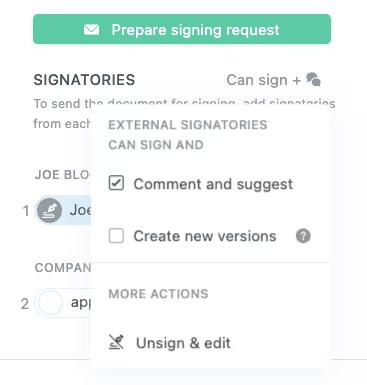Solutions
Customer Support
Resources
You’ve put pen to paper and signed on the dotted line. But then you realize the contract that now bears your name isn’t actually right for you at all. Can you “unsign” it?
The answer is… maybe. Let’s have a look at what you can do if you change your mind about signing something, without getting sued.
A contract is a legally binding agreement between two or more parties. But that doesn’t mean it’s set in stone. So if you can come to an agreement with the other party, you might be able to end or change the contract without any penalties so you’re both happy. It’s always worth having a chat to see if you can compromise somewhere.
Most contracts have a clause telling you what to do if one of the parties wants to end it. So check that first. You might also have an “express right to terminate” clause, which gives reasons you can end a contract without breaching it. For example, it might have something like this:
“Either party can terminate this contract by writing to the other at least three months before the end of the initial period.”
Depending on when you signed it, and the type of contract it is, you might also have a cooling-off period. In the UK, consumers have 14 days to cancel a contract under the Consumer Contracts Regulations and the Consumer Credit Act.

When you do what you’ve promised to do in a contract it’s called “performance”. Sometimes it might be impossible to perform the terms of a contract though. Imagine you’ve entered into a contract to buy a designer handbag from someone. But before you hand over the cash, you die.
Obviously you can’t buy that handbag from beyond the grave. So the contract is terminated without a breach, as this was due to circumstances beyond anyone’s control. This is called “frustration”.
This is of course an extreme example. But if you think there’s a reasonable argument that you can’t perform your part of the contract for reasons that aren’t your fault, you might have grounds to terminate it. It’s a big “might” though – proving frustration in court can be tough.
You might also be able to break a contract if both you and the other party assumed something to be true that later turns out not to be.
Let’s go back to that handbag. Before any money changes hands you find out that that expensive one-of-a-kind purse is actually a fake, which the owner was also unaware of.
Because both of you thought it was real, you’re no longer obliged to go through with the contract, and it’s cancelled with no penalties for either side. This is called “rescission”, based on “innocent misrepresentation”.
If you can prove you’ve been tricked into signing a contract because it’s based on false information, you’ve got a very good chance of being able to get out of it with no penalties.
For example, if the person selling you that designer handbag did know it was a Louis Button rather than a Louis Vuitton, this is “fraudulent misrepresentation”. You’ll also be able to claim damages from them for this.
Misrepresentation can also be “negligent”. This is when one party says something in a contract without taking reasonable care to make sure it’s true. If you can prove negligent misrepresentation you can also terminate a contract with no penalties, and make a claim from the other party for damages.

If you’re signing a contract on behalf of the company you work for, you must have signature authority. This means you have the legal right to enter into contracts or agreements, both written and oral, that bind your employer to their terms and conditions.
If you can prove you didn’t have this authority, a contract might be voided (although the principle of “apparent authority” means this isn’t always cut and dried).
This might also apply if the person who signed the contract was under 18 or “lacks contractual capacity”, perhaps because they’re a vulnerable adult who isn’t capable of understanding its terms.
If you're using a contract automation tool like Juro, you may even be in a position to unsign a contract before it becomes legally binding.

If, say, you've sent a contract out with your signature on it, and the other parties have not yet added their signature, it's possible to unsign the contract and edit it before resending it for signing.
This is a great feature to use if you begin to get second thoughts about a contract, or if you find a mistake within it.
Within a manual contract workflow, you'll need to communicate your wish to revise and unsign the contract over email. The risk of doing this is that the counterparty could proceed to sign the contract anyway and argue that they'd signed it prior to you notifying them of your decision to rescind it.
Juro removes this risk by enabling you to automatically withdraw a contract from being sent for signing by selecting 'Unsign and Edit'.
However, it's worth noting that this feature won't be available if the contract has already been signed by all parties. This is because the agreement will be legally binding already.
At the end of the day, contracts are legally binding documents. So getting out of them isn’t meant to be easy. But if you made a genuine mistake when you signed something, or it doesn’t meet certain legal requirements, you might have good case to extricate yourself without too much heartache.
Fill in the form below to find out more about all-in-one contract automation and how it could help you.

Lorem ipsum dolor sit amet, consectetur adipiscing elit. Suspendisse varius enim in eros elementum tristique. Duis cursus, mi quis viverra ornare, eros dolor interdum nulla, ut commodo diam libero vitae erat. Aenean faucibus nibh et justo cursus id rutrum lorem imperdiet. Nunc ut sem vitae risus tristique posuere.

